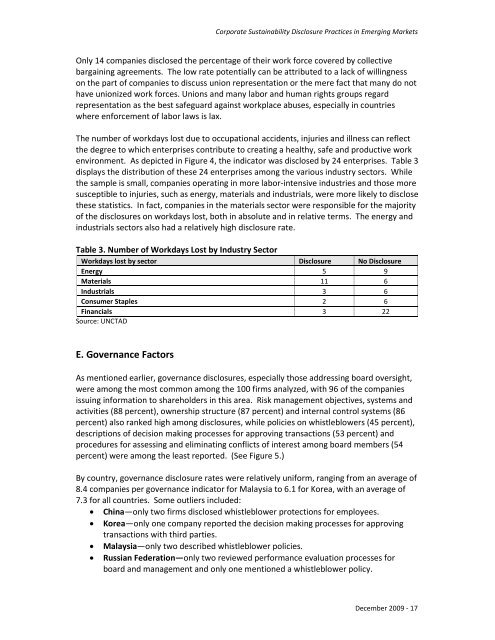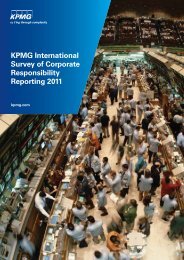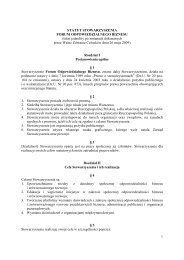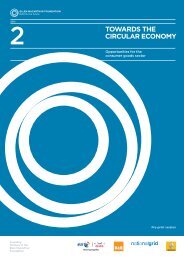Corporate Sustainability Disclosure in Emerging Markets
Corporate Sustainability Disclosure in Emerging Markets
Corporate Sustainability Disclosure in Emerging Markets
Create successful ePaper yourself
Turn your PDF publications into a flip-book with our unique Google optimized e-Paper software.
<strong>Corporate</strong> <strong>Susta<strong>in</strong>ability</strong> <strong>Disclosure</strong> Practices <strong>in</strong> Emerg<strong>in</strong>g <strong>Markets</strong>Only 14 companies disclosed the percentage of their work force covered by collectivebarga<strong>in</strong><strong>in</strong>g agreements. The low rate potentially can be attributed to a lack of will<strong>in</strong>gnesson the part of companies to discuss union representation or the mere fact that many do nothave unionized work forces. Unions and many labor and human rights groups regardrepresentation as the best safeguard aga<strong>in</strong>st workplace abuses, especially <strong>in</strong> countrieswhere enforcement of labor laws is lax.The number of workdays lost due to occupational accidents, <strong>in</strong>juries and illness can reflectthe degree to which enterprises contribute to creat<strong>in</strong>g a healthy, safe and productive workenvironment. As depicted <strong>in</strong> Figure 4, the <strong>in</strong>dicator was disclosed by 24 enterprises. Table 3displays the distribution of these 24 enterprises among the various <strong>in</strong>dustry sectors. Whilethe sample is small, companies operat<strong>in</strong>g <strong>in</strong> more labor-<strong>in</strong>tensive <strong>in</strong>dustries and those moresusceptible to <strong>in</strong>juries, such as energy, materials and <strong>in</strong>dustrials, were more likely to disclosethese statistics. In fact, companies <strong>in</strong> the materials sector were responsible for the majorityof the disclosures on workdays lost, both <strong>in</strong> absolute and <strong>in</strong> relative terms. The energy and<strong>in</strong>dustrials sectors also had a relatively high disclosure rate.Table 3. Number of Workdays Lost by Industry SectorWorkdays lost by sector <strong>Disclosure</strong> No <strong>Disclosure</strong>Energy 5 9Materials 11 6Industrials 3 6Consumer Staples 2 6F<strong>in</strong>ancials 3 22Source: UNCTADE. Governance FactorsAs mentioned earlier, governance disclosures, especially those address<strong>in</strong>g board oversight,were among the most common among the 100 firms analyzed, with 96 of the companiesissu<strong>in</strong>g <strong>in</strong>formation to shareholders <strong>in</strong> this area. Risk management objectives, systems andactivities (88 percent), ownership structure (87 percent) and <strong>in</strong>ternal control systems (86percent) also ranked high among disclosures, while policies on whistleblowers (45 percent),descriptions of decision mak<strong>in</strong>g processes for approv<strong>in</strong>g transactions (53 percent) andprocedures for assess<strong>in</strong>g and elim<strong>in</strong>at<strong>in</strong>g conflicts of <strong>in</strong>terest among board members (54percent) were among the least reported. (See Figure 5.)By country, governance disclosure rates were relatively uniform, rang<strong>in</strong>g from an average of8.4 companies per governance <strong>in</strong>dicator for Malaysia to 6.1 for Korea, with an average of7.3 for all countries. Some outliers <strong>in</strong>cluded:• Ch<strong>in</strong>a—only two firms disclosed whistleblower protections for employees.• Korea—only one company reported the decision mak<strong>in</strong>g processes for approv<strong>in</strong>gtransactions with third parties.• Malaysia—only two described whistleblower policies.• Russian Federation—only two reviewed performance evaluation processes forboard and management and only one mentioned a whistleblower policy.December 2009 - 17
















